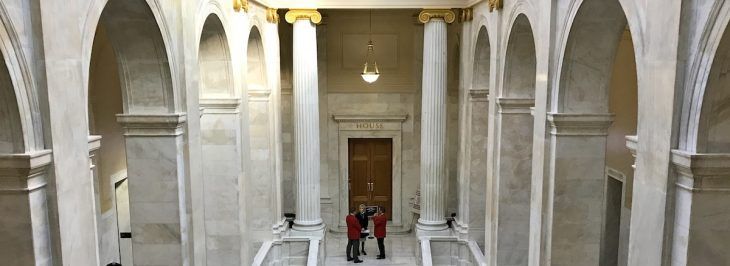Arkansas House votes to let future speakers pick committees
by January 11, 2017 6:54 pm 280 views

The Arkansas House of Representatives voted Wednesday to change its rules and give future speakers of the House the power to appoint committees. The rules change also would allow House members to raise campaign donations during fiscal sessions.
House Resolution 1001 by Speaker Jeremy Gillam, R-Judsonia, passed 75-23 with one present. It needed 67 votes, or two thirds of the body, to take effect.
Under the rules change, committees would be assigned on the first day of session in January after the speaker is elected by the House This year, committees were filled Nov. 10, two days after the general election. Previously, members have been divided by congressional district, and members in each district simultaneously selected their committees by order of seniority.
Gillam, who is not running for re-election to the House, argued that the process is too random and doesn’t result in committees being occupied by the most qualified members. With so many members being elected in the same year, seniority often is determined based on numbers picked from a bowl – resulting, for example, in Rep. Stephen Meeks, R-Greenbrier, drawing a number 25 points more senior than his brother, Rep. David Meeks, R-Conway.
The new process would allow the speaker to appoint House members to the appropriate committee based on their skill sets and passions, Gillam said.

Gillam said speakers of the House select committee members in 44 other states – a discovery that helped address his own initial misgivings over the idea. The increased role for the speaker would be an “administrative function,” not a power, he asserted. He also argued that the body has inherent checks and balances to prevent speakers from gaining too much power, and that speakers would have to take into account the desires of the members in determining the committees’ memberships.
“Almost every state in the country is doing what I’m proposing,” he said. “It’s not reinvention of the wheel. It’s just bringing the wheel to Arkansas.”
Several House members from both parties expressed opposition to the change. Rep. Reginald Murdock, D-Marianna, said members are elected to represent their districts, which the speaker can’t do for them. Rep. Charles Blake, D-North Little Rock, questioned how the change was not giving the speaker more power. Rep. John Walker, D-Little Rock, said the speaker could not know the skill sets of the members.
“We cannot allow the speaker to be one who exercises all the determinations that we were elected to fill,” Walker said.
Republican legislators also spoke against the change. Rep. Kim Hendren, R-Gravette, said the rules change would allow the speaker to remove committee chairs and complained that his own proposed rules changes had not been heard. Rep. Mickey Gates, R-Hot Springs, said a member jockeying for the speaker’s position could promise committee assignments in order to be elected. Rep. Jana Della Rosa, R-Springdale, questioned if the system would work better than the current one and expressed fears of a future speaker abusing the power.
Gillam said future speakers would need the support of the entire body and expressed faith that they would act fairly and wisely.
“Some have said, ‘Well, what if this went bad?’ I challenge you today, ‘What if it goes great?’” he said. “I choose to believe this a glass-half-full opportunity for us.”
Also in the rules change was a provision allowing House members to raise campaign funds during fiscal sessions, which occur during election years. Gillam said the change was meant to align the House with the Senate and constitutional officers as well as with local officials – “with everyone else in this building and this state” – who are not prohibited from raising funds during that time period.
Members were required to vote for both changes as part of the entire rules resolution.
